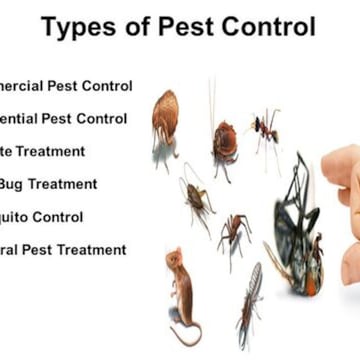Pest Control for Dummies
Pest Control for Dummies
Blog Article
Pest Control Can Be Fun For Anyone
Table of ContentsSome Known Facts About Pest Control.Everything about Pest ControlA Biased View of Pest ControlThe Of Pest ControlWhat Does Pest Control Do?
Limitations of Chemical Management Be able to evaluate insect issues, establish if administration is needed, and make suitable referrals utilizing IPM strategies. Know with various methods of parasite monitoring - their advantages and restrictions. Understand the worth of valuable insects. It is not possibleor even desirableto rid yards of all pests.This phase discusses (IPM), a technique that utilizes expertise regarding insects and their, practices, nonchemical approaches, and chemicals to manage bug issues. Additional info about IPM for particular plants is consisted of in chapters that focus on those plants. Nonchemical insect control measures are stressed in phase 17, "Organic Gardening." Handling birds and animals is covered in chapter 20, "Wild animals." Managing in the backyard and garden is covered in phase 6, "Weeds." Pests in a yard or landscape might consist of bugs and termites, weeds,, creatures, and birds.
Bugs and weeds, however, play a role in the. After planting a garden or establishing a yard, the natural procedure of plant succession starts to reestablish and nonnative plants.
What we call "bugs" become part of a natural system at the office. A community has no insects. Only humans think about certain species parasites when they happen where they are not desired. We will certainly be much more effective in managing undesirable varieties when we realize that these organisms comply with foreseeable patterns that we can utilize to our benefit.
What Does Pest Control Do?
Bugs at risk to a chemical were rapidly eliminated, leaving resistant ones to breed and multiply. It became clear that pesticides alone would not solve all parasite issues. Instead, overuse of chemicals caused the growth of resistant parasites. Scientists started to create a new strategy to pest control. This brand-new approach was called integrated pest administration (IPM).
An IPM plan enables some level of bugs in the setting. Pests are much less likely to make it through a program that uses several techniques of decreasing their populations. Integrated pest management was very first suggested by entomologists because bugs were the very first team of bugs to confirm difficult to take care of with chemicals alone.
A limit is the point at which activity should be taken. IPM has extended beyond bugs to management of all pest populaces: weeds, illness microorganisms, and animals.
Pest Control Fundamentals Explained
Management instead than removal of parasites is the goal. An IPM strategy begins with a cautious assessment of each pest infestation.
Clover expanding in a yard may be checked out as an undesirable weed, but as a legume it is manufacturing nitrogen for the soil and the flowers are offering nectar to honey and various other. Tolerance for some weeds might be component of an IPM plan. may be consuming the fallen leaves of a plant, but when they are identified as the larvae of Eastern tiger swallowtail check it out butterflies, their damage may be tolerated so we can enjoy the lovely butterfly.

The second essential tool in parasite management is very early intervention. Being existing and watchful in the garden makes certain very early discovery. Reacting to troubles rapidly, before they have time to multiply, requires a much less remarkable intervention. The third most important device is recordkeeping; tracking what happens in the yard makes it possible for a gardener to recognize patterns and make educated choices.
Not known Facts About Pest Control
Many my site risk-free, useful, nonchemical techniques of plant protection and bug management might reduce or get rid of the demand to spray. Various other methods are most useful when utilized with chemicals. To apply management practices correctly and to decrease losses, gardeners must know the kinds of bugs that attack plants and recognize pest biology.

Conducting a soil examination and applying just the recommended quantity of plant food and lime makes best use of the benefit to the plant while lessening problems associated to excessive use plant food - Pest Control. Covering the dirt with look at this website numerous inches of mulch protects the plant in numerous methods: lowering soil water loss to evaporation, decreasing weed competitors, giving nutrients, and producing a suitable atmosphere for earthworms and bacteria that maintain the soil loosened for roots and break down organic material to release nutrients
If mulch touches the trunk, it can produce a method for voles, microorganisms, and fungi to strike the plant. Do not use manure or garden compost that has actually not thoroughly broken down as a top dressing since it can encourage unwanted bugs. Research study suggests that tilling the dirt is harmful to dirt structure.
The Ultimate Guide To Pest Control
If tilling is regarded necessary, consider doing it in the autumn when the life cycles of numerous insects brings them near the surface area. At the surface, pests end up being revealed to the weather as well as birds and various other all-natural enemies.
Report this page